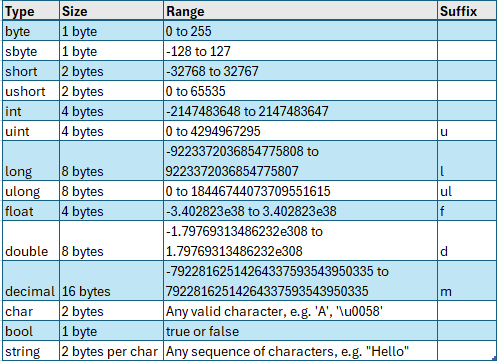HTML
CSS
Bootstrap
JavaScript
C#
SQL
Salesforce Admin
Exercise
Study Material
✔ C# Tutorial
✔ C# Basic
✔ C# Control Statement
✔ C# Function
✔ C# Arrays
✔ C# Object Class
✔ C# Properties
✔ C# Inheritance
✔ C# Polymorphism
✔ C# Abstraction
✔ C# Namespace
✔ C# Exception Handling
✔ C# Collections
✔ C# Misc
Data Types in C#
Data types are fundamental to programming in any language, determining the kind of values variables can hold and the operations applicable to them. In C#, it’s essential to declare the type of a variable beforehand, enhancing code reliability and readability.
Value Types and Reference Types
C# classifies data types into two categories: value types and reference types.
▪ Value types: store data directly in their memory allocation. Examples include int, float, bool, char, enum, and struct.
Example
int value1 = 10;
int value2 = value1; // value2 gets a copy of value1
value2 = 20; // Changing value2 doesn’t affect value1
Console.WriteLine(“Value1: ” + value1); // Output: 10
Console.WriteLine(“Value2: ” + value2); // Output: 20
▪ Reference types: store references to memory locations containing the actual data. Examples comprise object, string, class, interface, delegate, and array.
Example
int[] array1 = { 1, 2, 3 };
int[] array2 = array1; // array2 points to the same memory location as array1
array2[0] = 5; // Modifying array2 also modifies array1
Console.WriteLine(“Array1[0]: ” + array1[0]); // Output: 5
Console.WriteLine(“Array2[0]: ” + array2[0]); // Output: 5
Predefined Data Types
C# provides predefined data types, also termed built-in or simple data types, categorized as follows:
Numeric types: Used for storing numbers, such as int, long, byte, float, double, decimal, etc.
Boolean type: Stores true or false values.
Character type: Stores single Unicode characters.
String type: Stores sequences of Unicode characters.
Below is a summary of predefined data types, including their sizes, ranges, and suffixes:

Examples of Predefined Data Types
Below are examples demonstrating the declaration and initialization of variables with different predefined data types:
int age = 25;
float temperature = 98.6f;
char grade = ‘A’;
bool isRaining = true;
string name = “John”;
User-Defined Data Types
Numeric Types: Used for storing numeric values, encompassing both integer types (such as int, long, byte) and floating-point types (such as float, double, decimal).
Boolean Type: Represents logical true or false values, denoted by the bool keyword.
Character Type: Stores single Unicode characters, represented by the char keyword.
String Type: Stores sequences of Unicode characters, denoted by the string keyword.
Example of User-defined Data Types
public class Person {
public string Name { get; set; } // Property to store person’s name
public int Age { get; set; } // Property to store person’s age
}
Person person1 = new Person();
person1.Name = “Alice”;
person1.Age = 30;
Console.WriteLine($”Name: {person1.Name}, Age: {person1.Age}”);


